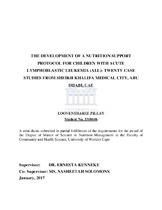| dc.description.abstract | Acute lymphocytic leukemia (ALL) is the most common type of childhood cancer accounting for approximately 25% of cancers diagnosed in children less than 20 years of age. It originates in the bone marrow and prevents the normal manufacture of red blood cells, white blood cells and platelets. A poor nutritional status is frequently observed in children with ALL at the time of diagnosis and during treatment which may result in protein energy malnutrition if nutrition intervention is delayed. This retrospective study aims to assess the nutritional status of children newly diagnosed with Acute Lymphoblastic Leukemia (ALL) using 20 case studies between 1 January 2013 and 31 December 2014 from Sheikh Khalifa Medical City (Abu Dhabi, UAE), in order to develop an appropriate nutritional support protocol for pediatric ALL patients treated at this institution. Study Design: A retrospective descriptive case study design was used. The study population consisted of 20 electronic medical records of patients aged between 1-14 years who were newly diagnosed with Acute Lymphoblastic Leukemia (ALL) and admitted to Sheikh Khalifa Medical City for treatment during the period 1 January 2012 and 31 Dec 2014. Data Collection: Identification of suitable participants began through a review of each potential study participant`s electronic medical record. Data was collected and recorded on a data collection form (Appendix III) from the electronic medical record for each suitable participant for the following at admission and during the full duration of all phases of cancer treatment namely induction, consolidation, interim maintenance, delayed intensification and maintenance. The data collected comprised of the following: age, gender, date of diagnosis, symptoms on diagnosis, the cancer diagnosis (type and subtype), anthropometric measurements (weight, length/ height, head circumference), biochemical values (visceral proteins, blood glucose levels, hemoglobin, hematocrit, lymphocyte count), clinical assessment (stomatitis, anemia, mucositis), diet history (home feeding regimes; consumption of daily requirements; food preferences – types, textures; food allergies, food intolerances; food aversions; use of oral nutritional supplements; treatment-related side-effects; systemic related side-effects (nausea; vomiting; diarrhea; anorexia; appetite changes; taste changes; physical activity level; depression), dietary requirements (age and gender related nutritional requirements for energy, protein, fat and fluids) and indications for nutritional support (oral feeding; enteral feeding; parenteral feeding). Analysis of Results: The weights and length/ heights of participants recorded in the electronic medical records were converted to z-scores on the World Health Organization growth charts. The diet prescription of nutritional intervention was interpreted in comparison to the biochemical indices, anthropometric status and dietary intake of each participant. All the data involving changes in anthropometrics, biochemistry, diet history and nutritional interventions from each case study (from diagnosis and through all stages of treatment) was screened and compared with reference values in the context of the age and sex of the child. Evidence based nutritional guidelines were used to document the outcomes of the medical nutrition treatment provided in order to develop a nutrition support protocol for children with Acute Lymphoblastic Leukemia at Sheikh Khalifa Medical City. Results: The results showed that weight loss expressed as a percentage of body weight provided a more accurate estimate of the true significance of weight loss in subjects undergoing cancer treatment (chemotherapy) for ALL. A weight loss of greater than 5% of body weight over a period of one month is considered a sign of nutritional deprivation even if the subject is not classified as undernourished by anthropometric parameters. Subjects experienced the highest weight loss during the consolidation phase and interim maintenance phases of treatment. Conclusion: It can therefore be concluded that pediatric subjects on cancer treatment for ALL at SKMC and receiving nutritional support underwent changes in nutritional status as manifest by a reduction in more than 5% of their body weight during three phases of treatment namely induction, consolidation and interim maintenance. An appropriate nutrition support protocol was developed based on the results and experience obtained from this study for pediatric ALL patients treated at SKMC. | en_US |

